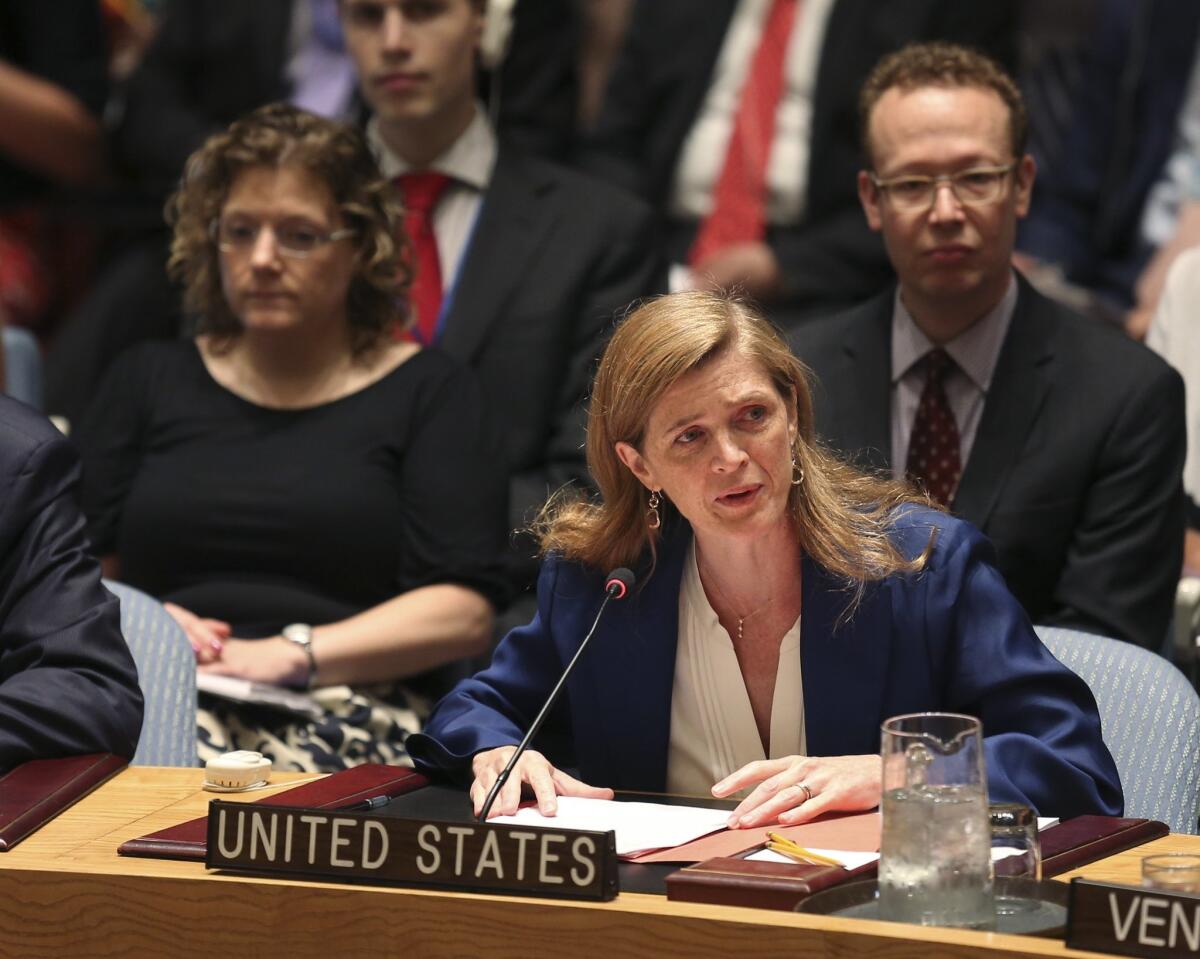U.N. Security Council unanimously backs Iran nuclear accord

Samantha Power, U.S. ambassador to the United Nations, speaks after a vote in the Security Council at U.N. headquarters on Monday. The U.N. Security Council unanimously endorsed the landmark nuclear deal between Iran and six world powers and adopted a series of measures leading to the end of U.N. sanctions that have hurt the Iranian economy.
- Share via
Reporting from New York — The United Nations Security Council on Monday unanimously endorsed a deal aimed at halting Iran’s nuclear weapons program, a plan the U.S. representative said would make the world “safer and more secure.”
The 15-0 vote on the resolution was swift, coming just a couple of minutes after the members convened in the meeting hall. The resolution sets the stage for the phasing out of several U.N. sanctions resolutions passed since 2006, which have included the freezing of assets and an arms embargo.
Some members of Congress had urged the United Nations to wait until U.S. lawmakers had considered the accord. A congressional vote is not expected until September, too long for Security Council members who have spent years trying to hammer out a deal to end the rancor over Iran’s nuclear program.
The U.S. ambassador to the U.N., Samantha Power, said the deal will not eliminate all of the United States’ concerns about Iran. She specifically mentioned the detention of three U.S. citizens in Iran: journalist Jason Rezaian; former U.S. Marine Amir Hekmati; and pastor Saeed Abedini. Power also noted a fourth American, Robert Levinson, who went missing in the region in 2007.
“If implemented, it would make the world safer and more secure” by preventing Iran from being able to develop a nuclear weapon, she said.
“This deal gives Iran an opportunity to prove to the world that it intends to pursue a nuclear program solely for peaceful purposes,” she said.
In addition to the five permanent Security Council members – Britain, China, Russia, the United States and France – Germany was part of the diplomatic bloc that worked on the accord. The 109-page agreement would block Iran from building a nuclear bomb for more than a decade and give U.N. nuclear inspectors broad powers to keep an eye on Iran’s activities.
The plan, announced Tuesday, would suspend sanctions against Iran and enable it to resume selling oil, rejoin the international financial system and get access to about $100 billion in frozen assets once the International Atomic Energy Agency verified its compliance with restrictions on its nuclear development.
Supporters of the deal say it would allow sanctions to be reinstated if Iran violated terms of the agreement. Critics, notably Israel and some American lawmakers, say it will empower Iran financially and militarily, adding to the Middle East’s volatility.
As speaker after speaker applauded the council’s endorsement, Iran’s U.N. representative delivered a grudging acceptance of the resolution, describing his country’s nuclear program as peaceful. Referring to the sanctions, Gholam Ali Khoshroo said: “They are grounded on nothing but baseless speculation and hearsay.”
“Iran is a stable country in an unstable region,” said Khoshroo, adding that problems in the region were rooted not in Iranian actions but in “feckless and reckless acts by the United States.”
But he said the nuclear deal had restored Iran’s faith in diplomacy to resolve problems, even as he described the dispute over Iran’s nuclear program as “an unnecessary crisis.”
“We honestly hope it helps turn the page in our region,” said Khoshroo.
But underscoring the divisions that remain, the U.N. representative from Israel, Ron Prosor, denounced the vote in a statement after the meeting.
“Today, you have awarded a great prize to the most dangerous country in the world,” he said, calling the deal “dangerous to the region, to the people of the region.”
Follow @tinasusman on Twitter
More to Read
Sign up for Essential California
The most important California stories and recommendations in your inbox every morning.
You may occasionally receive promotional content from the Los Angeles Times.














